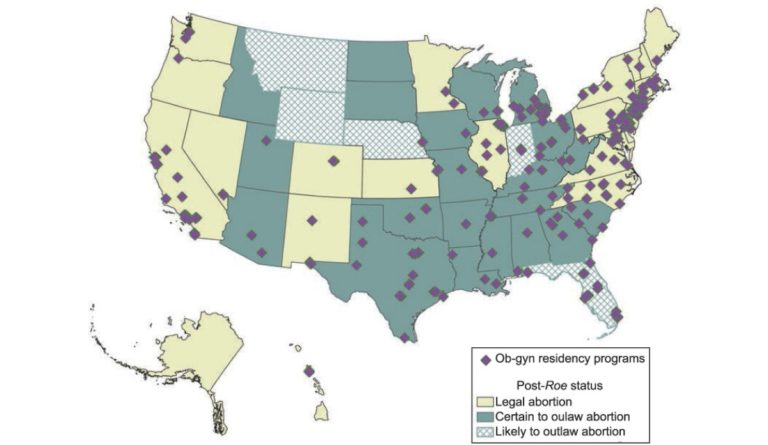Dobbs and Doctors
Of the more than 6,000 residents training to be OB-GYNs in the U.S., 43.9% are at programs in abortion-restrictive states and therefore will not have access to abortion training.

Read Time: 2 minutes
Published:
Abortion access has gone from liberty to luxury. The Dobbs v Jackson Supreme Court decision overturned 50 years of precedent, ending federal protection for abortion access. In abortion-restrictive states, the decision has damaged all reproductive care. Finding a doctor who specializes in reproductive care may become impossible in states that have limited or banned abortion.
Dr. Kavita Vinekar and fellow researchers investigated how the decision would affect new doctors’ training to be OB-GYNs. The study compared data on location and accreditation requirements for obstetrics programs in the U.S. and with Guttmacher Institute policy analyses to determine which states were likely or certain to ban abortion following Dobbs.
The map above shows the states color-coded by which are likely to protect abortion, were certain to ban abortion, and were likely to ban abortion. They overlayed locations of the 286 U.S. OB-GYN residency programs on the map. Of the U.S.’s OB-GYN residency programs, 128 are in states certain or likely to ban abortion. The research found that of the 6,007 residents currently training to be OB-GYNs, 43.9% are at programs in abortion-restrictive states and will therefore not receive training on abortion.
Prior to the Dobbs decision, 92% of OB-GYN residents reported having access to some level of abortion training. With the new abortion bans, the study predicts the number will plummet to 56%. OB-GYN residents are required to have training in abortion for licensure. With bans and limitations on abortion, hospitals may not be able to meet the accreditation requirements to license and train OB-GYN residents.
Over half the doctors in the U.S. continue to work in the state where they complete their residency. Reports suggest that new OB-GYN residents might flock to the states that protect abortion. Others are going overseas for the training they cannot receive here. OB-GYNs lacking reproductive care skills will be limited professionally, including the possibility of not being licensed, and experienced OB-GYNs will face higher demand.
Databyte via Kavita Vinekar MD, MPH et al. Projected Implications of Overturning Roe v Wade on Abortion Training in U.S. Obstetrics and Gynecology Residency Programs, Obstetrics and Gynecology, 2022.



